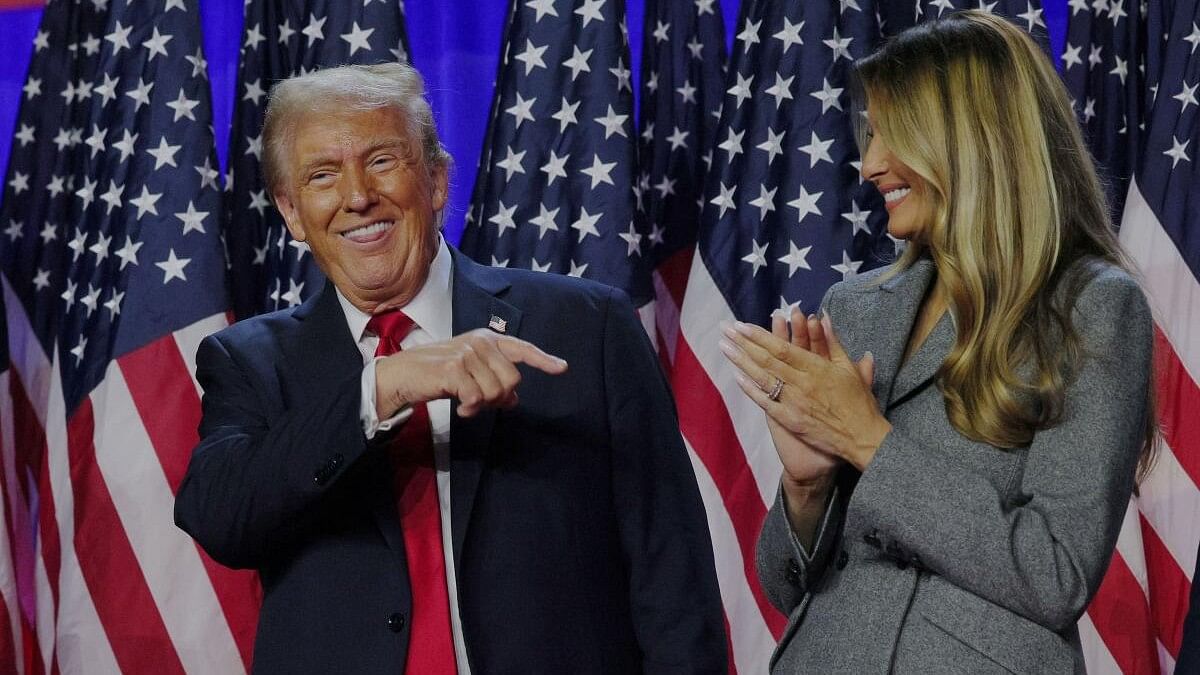
Republican presidential nominee and former US President Donald Trump points to his wife Melania at Trump's Election rally, at the Palm Beach County Convention Center in West Palm Beach, Florida, US, November 6, 2024.
Credit: Reuters Photo
Futures tied to the S&P 500 and the Dow hit record highs in a sharp rally on Wednesday after Republican Donald Trump reclaimed the US presidency, capping his return four years after he was voted out of the White House.
As votes added up, so-called Trump trades rallied, US Treasury yields surged, bitcoin hit a record high, and the dollar gained.
Here's how markets in the US and across the world reacted to a looming Trump win:
US Market
Dow futures jumped more than 1,200 points, while those tracking the benchmark index crept closer to the psychologically significant 6,000 level.
Futures tracking the small cap Russell 2000 soared 6.2 per cent to their highest levels since early 2022 as domestic-focused stocks expect to benefit from an easier regulatory and tax regime, as well as be less exposed to likely import tariffs.
Stocks that were expected to perform well if Trump wins a second term jumped. Trump Media & Technology Group soared 30.7 per cent, and prison operators Geo Group and CoreCivic gained 30 per cent and 22.4 per cent, respectively.
Tesla shares leapt 15 per cent as top shareholder and CEO Elon Musk has supported Trump throughout his electoral campaign.
Strong gains were also seen in shares of banks, cryptocurrency companies and energy firms, while renewable energy shares fell.
The Republican party also gained control of the US Senate, and posted early gains in the battle to maintain control in the House of Representatives.
A so-called "clean sweep", in which one party captures the presidency, the House and the Senate would give Trump an easier route to push through desired legislation.
The VIX, a measure of market volatility, dropped sharply to its lowest since September. Investors have been bracing for several days of uncertainty over who the winner of the presidency would be.
Dow E-minis were up 1,211 points, or 2.86 per cent, U.S. S&P 500 E-minis were up 132.5 points, or 2.28 per cent and Nasdaq 100 E-minis were up 359.75 points, or 1.77 per cent.
Wall Street analysts expect Trump's plans for restricted immigration, tax cuts and sweeping tariffs to put upward pressure on inflation and bond yields, while corporations could benefit from his tax and regulatory policies.
Later in the day, the Federal Reserve will kick off its two-day meeting where the central bank is expected to ease benchmark interest rate by 25 basis points.
However, bets on a December rate cut reduced slightly to 68 per cent from nearly 80 per cent on Monday, as per CME FedWatch.
European shares rally as Trump claims victory
European shares jumped nearly 2 per cent on Wednesday, tracking a rise in US stock futures, as Donald Trump claimed victory in the presidential election and Republicans took control of at least one chamber of Congress.
Fox News projected that he had defeated Democrat Kamala Harris, although other news outlets are yet to call the race.
The pan-European STOXX 600 added 1.7 per cent, on track for its biggest single-day advance so far this year.
Futures tracking the S&P 500 jumped more than 2 per cent. Trump has already won the swing states of North Carolina, Georgia and Pennsylvania and holds leads in several others, according to Edison Research.
India
Stock markets rallied more than 1 per cent on Wednesday with benchmark Sensex soaring 901 points on heavy buying in IT and pharma shares as Donald Trump is all set to win the US presidential elections.
Extending its gains to the second day, the BSE Sensex jumped 901.50 points or 1.13 per cent to settle at 80,378.13. During the day, it soared 1,093.1 points or 1.37 per cent to 80,569.73.
The NSE Nifty soared 270.75 points or 1.12 per cent to close at 24,484.05.
China, Hong Kong
China's yuan and stock markets fell sharply on Wednesday as the prospect of another Donald Trump presidency and Republican control of US Congress risked heightened tensions over trade and technology.
By the time Chinese markets closed, Trump had claimed victory over Democrat Kamala Harris in the tight US presidential race.
China's blue-chip CSI300 Index fell 0.5 per cent, while Hong Kong's benchmark Hang Seng, which is more indicative of foreign investor sentiment, fell 2.3 per cent.
The Hang Seng China Enterprises Index fell 2.6 per cent.
Hong Kong-listed China tech stocks declined broadly, with e-commerce giant JD.com and Alibaba down 4 per cent each.
With Reuters inputs